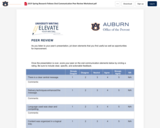
Once you have a draft of your oral presentation, this peer review worksheet can help you self-assess or get feedback.
- Subject:
- Composition and Rhetoric
- English Language Arts
- Material Type:
- Reading
- Provider:
- Auburn University
- Date Added:
- 10/07/2022

Once you have a draft of your oral presentation, this peer review worksheet can help you self-assess or get feedback.
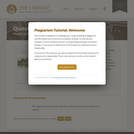
This tutorial is designed to challenge your understanding of plagiarism and the ethical use of sources in academic writing. You will see ten samples of source material and ten corresponding examples of student writing. It is up to you to determine if the student has used each source responsibly.
At the end of this exercise, you will be asked to list three best practices for using sources responsibly. These rules and your results can be shared with your professor.
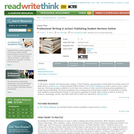
Writing professional reviews teaches students to understand audience, content, and publication guidelines. In this lesson, students put these into practice as professional writers critiquing, designing, and publishing reviews on Amazon.com.
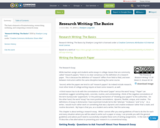
The basic elements of brainstorming, researching, outlining, and composing a research essay.
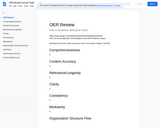
Review of Intro to Academic Writing for ESOL
https://drive.google.com/open?id=1iaglJGk6ZPlVu9kZ_u7fXpc7qA7Bcwi7uVBEry7g2pU
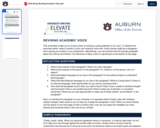
This worksheet invites you to revise a piece of writing by paying attention to its voice within a sample paragraph.
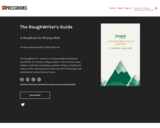
The RoughWriter's Guide is a writing handbook designed specifically for Yavapai College students. The Guide provides students with help navigating academic writing, including all aspects of the writing process, MLA and APA formatting, and grammatical and mechanical issues.

The science essay uses science to think about the human condition; it uses humanistic thinking to reflect on the possibilities and limits of science and technology. In this class we read and practice writing science essays of varied lengths and purposes. We will read a wide variety of science essays, ranging across disciplines, both to learn more about this genre and to inspire your own writing. This semester's reading centers on "The Dark Side," with essays ranging from Alan Lightman's "Prisoner of the Wired World" through Robin Marantz Henig's cautionary account of nano-technology ("Our Silver-Coated Future") to David Quammen's investigation of diseases that jump from animals to humans ("Deadly Contact").

This course provides an introduction to writing about science (including medicine, technology, and engineering) for general readers. With a strong emphasis in background research, this course will help students build a foundation for strong science writing. Students will read works by accomplished science writers. Each assignment will focus on a different popular form, such as news articles, interviews, essays, and short features.

Proficiency in communicating about science and technology comes from both knowledge and practice, and this course emphasizes both. Through a variety of reading and writing assignments, we will examine general principles of good writing, as well as principles associated specifically with scientific and technical writing. We will also explore the effects of new media as avenues for communicating about science.

Like other scientists, medical researchers and clinicians must be capable of presenting their work to an audience of professional peers. Unlike many scientists, however, physicians must routinely translate their sophisticated knowledge into lay terms for their own patients and for the education of the public at large. A surprising number of physicians write for less utilitarian reasons as well, choosing the narrative essay as a means of exploring the non-technical issues that emerge in their clinical practice. Over the course of the semester, we will explore the full range of writings by physicians and other health practitioners.

Environmentalists have traditionally relied upon the power of their prose to transform the thoughts and behavior of their contemporaries. In 1963, Rachel Carson, a marine biologist with a penchant for writing, described a world without wildlife in Silent Spring and altered the way Americans understood their impact on the landscape. Like other writers we will encounter this semester, Carson realized that she could alter the perceptions of her contemporaries only if she was able to transmit her knowledge in engaging and accessible language. We will do our best to follow in her footsteps.

This class addresses the craft of writing about science in and for contemporary society, both its pleasures and its challenges. We will read essays, reportage, op-eds, and web-based articles on a variety of topics concerning science, technology, medicine and nature. Readings by contemporary writers such as Elizabeth Kolbert, Atul Gawande, and Michael Pollan will serve as examples of the craft and sources of ideas for our own writing.
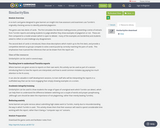
A no-tech card game designed to give learners an insight into how assessors and examiners use Turnitin's originality checking service to identify potential plagiarism.The game uses two decks of cards. The first simulates the decision making process, presenting a series of extracts from Turnitin reports and asking students to judge whether they show examples of plagiarism or not. These are then compared to a model answer (which is open to debate - many of the examples are borderline) and students asked to reflect on and challenge any disagreement.The second deck of cards is introduced, these show descriptions which match up to the first deck, and provide a competitive element as groups compete to solve a word puzzle by correctly matching the pairs of cards. This emphasises how nuanced the inferences that can be drawn from the report are.Uses of the resourceSimilaritySim can be used in several ways.Teaching how to understand Turnitin reportsWhere learners are given access to reports on their own work, this activity can be used as part of a session introducing them to how the reports are interpreted, and how to avoid common mistakes (eg paying too much attention to the % score).It can also be valuable in staff development sessions, to train staff who will be interpreting the reports in a scaffolded way that can be more engaging than simply showing examples on a screen.Academic integrity trainingSimilaritySim can be used to show students the range of types of unoriginal work which Turnitin can detect, which can help them to understand the difference between switching out a couple of words and proper paraphrasing. (Although care should be taken the importance of not plagiarising, rather than merely beating Turnitin).Reducing anxietySome learners are quite nervous about submitting high stakes work to Turnitin, mainly due to misunderstanding the way in which Turnitin is used. This activity shows them that their assessor will need to spend considerable time working with the report, rather than it being a "computer says no" scenario.
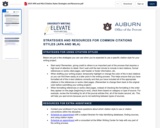
Below are just a few strategies you can use when you’re expected to use a specific citation style for your writing project.
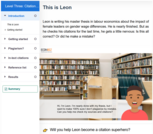
In this training, students develop strategies to avoid unintentional plagiarism in their economics and business papers. The interactive exercises cover the following topics: recognizing different types of plagiarism, correctly using quotations and paraphrases (in APA style), correctly citing sources in the text and in the reference list.

This course is a series of lectures on prospectus and thesis writing. It is a required course for undergraduate Nuclear Science and Engineering majors, taken during the fall semester of their senior year. Students select a thesis topic and a thesis advisor who reviews and approves the prospectus for thesis work in the subsequent spring term.
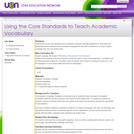
In this lesson students will use the core standards and an academic vocabulary template (adapted from Janet Allen and Robert Marzano) to explicitly learn the academic language they will need to understand, not only in English Language Arts, but in all content areas.
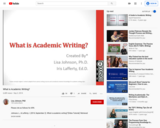
Johnson, L., & Lafferty, I. (2014, September 2). What is academic writing? [Video Tutorial]. Retrieved from Lisajohnsonphd on YouTube: http://youtu.be/Zn8Ja92b3ZI
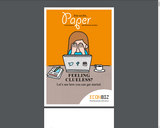
As a student one often struggles with developing a research question, finding scholarly papers or citing correctly.
The booklet “Write your best Paper” (pdf) summarizes the most important topics in a step by step instruction with a timeline and practical tips.